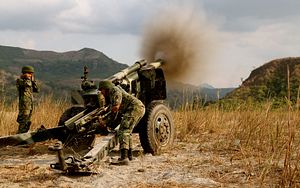The United States and the Philippines began this year’s iteration of their annual war games on Monday as China issued a pointed warning about outside interference in the ongoing South China Sea disputes.
Some 8,000 U.S. and Philippine will participate in the Balikatan exercises, which will run from April 4 to April 15. Australian troops will also participate in Balikatan this year, while several countries sent observers.
The drills will involve various activities including simulation supported events, operation events, and humanitarian civil assistance projects. They are expected to include a simulation of the retaking of an island seized by an unspecified country in the South China Sea, an amphibious landing, and the implementation of a joint rapid reaction force.
On the Philippine side, officials said the exercise will involve five unit commands – the Western Command in Palawan, the Northern Luzon Command in Tarlac, the Central Command in Cebu and Panay, the Southern Luzon Command in Lucena, and the Joint Task Force in Manila. It will also feature key military assets, including the country’s newly acquired FA-50 light combat aircraft from South Korea.
On the U.S. side, a highlight this year is the fact that Ash Carter will become the first U.S. defense secretary to observe the Balikatan exercises in the Philippines. U.S. exercise director Lt. Gen John Toolan, commander of U.S. Marine forces in the Pacific, said at the opening ceremony that Carter will arrive towards the end of the exercises and observe some activities, including the performance of two M142 High Mobility Artillery Rocket System (HIMARS) units, which are being deployed for the first time in the exercise, as well as U.S. Navy ships out at sea. The Diplomat understands that Carter is also expected to visit the Western Command in Palawan, the center of an ongoing U.S. initiative to build a common operating picture in the South China Sea through its new Southeast Asia Maritime Security Initiative (See: “America’s New Maritime Strategy Initiative for Southeast Asia“).
Major General Rodolfo Santiago, the assistant exercise director, said that the drills were designed to practice “generic scenario[s]” and were not directed at any country despite China’s growing assertiveness in the South China Sea, which included the seizure of Scarborough Shoal from the Philippines back in 2012 as well as the continued harassment of Philippine fishermen, vessels, and aircraft. A verdict on the Philippines’ Permanent Court of Arbitration (PCA) case against China on the South China Sea is expected in May or June.
But when Toolan was asked whether the situations which were being practiced by the two allies involved a crisis in the South China Sea, he said: “It does, absolutely.”
Predictably, Xinhua issued a hard-hitting editorial as the exercise launched, warning the Philippines against its continuing attempts to involve “outsiders” in a “regional row.”
“The upcoming U.S.-Philippine military exercises caps Manila’s recent attempts to involve outsiders in regional row. However, a provocation so fear-mongering and untimely as such is likely to boomerang on the initiators,” it said.

































